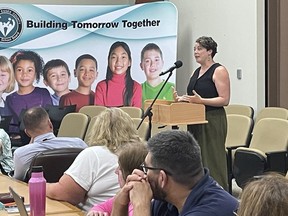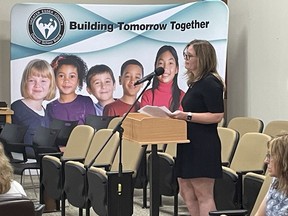
Article content
The local public school board on Tuesday approved a $532-million budget containing a $6.38-million deficit, but more job cuts could be coming.
Despite choosing an administration-provided option containing the least number of staffing cuts — 21 positions — the Greater Essex County District School Board might still eliminate additional personnel and services.
Advertisement 2
Article content
In approving next year’s spending, trustees at the special budget meeting also directed a review of all expenses not funded by the province — much of which is the cost of special education teachers and social workers.
By approving the deficit budget, the board is now mandated by Ontario’s education ministry to provide a plan to eliminate what is classified as structural deficit within two years.
The budget and that plan must be submitted to the ministry by June 28.
There are more than 800 unfunded positions in the budget in special education, consultants, para-professionals and education support workers, and they represent the major portion of the expenses to be reviewed by the board.
Unfunded spending in the budget includes $10 million for special education, $8.1 million for supply staff, $2.9 million for student transportation, $1 million for justice, inclusion, equity and diversity, and $5.6 million for federal statutory benefits such as employment insurance and pensions.
Board chair Gale Hatfield is urging the community to help put pressure on the province to provide more funding to avoid additional staff cuts.
Article content
Advertisement 3
Article content
“I think our community or school communities or parents need to rise up, say we’re mad as hell and we’re not going to take it anymore when it comes to underfunding public education,” Hatfield said. She abstained from the budget vote, explaining she didn’t know what the deficit elimination plan will ultimately contain.
Trustee Julia Burgess asked administration whether a review of staffing and funding cuts would be onerous to complete.
“We already know everything that’s unfunded,” director of education Vicki Houston replied. “We know, and I caution that a majority of that, unfortunately, is positions. We’ve said that an abundant number of times.”
This whole budget is a risk for us
Trustee Sarah Cipkar, who chairs the finance committee, conceded the currently approved budget may not gain approval from the ministry. “I think at this point … this whole budget is a risk for us.”
Asked for her opinion on how the ministry may view the deficit reduction plan, board superintendent of business Shelley Armstrong was blunt: “I think that it lacks specificity … I think the ministry’s going to look at this and say, ‘How does this actually adjust your cost structure?’
Advertisement 4
Article content
“And so I think it’s vague. I think that, more likely than not, it will probably come back either to be more specific, or they may tell us to go back and do more work. But they will certainly increase the level of monitoring that we will be under.”
Trustees settled on using last year’s deficit elimination plan, which included reviewing program delivery and boundaries for French immersion, transportation operator agreements, and all non-salary budgeted expenses.
They also directed that a letter be sent to the ministry pleading for more money to pay for employment insurance, pensions, short-term supply teachers, transportation costs, inflationary adjustments, special education and mental health supports.

Mario Spagnuolo, president of the Greater Essex Elementary Teachers’ Federation of Ontario, said after the meeting the decision by trustees to review unfunded spending means re-examining positions trustees were trying to save.
“It’s very worrisome because they’ve already cut 21 positions in special education.
“And if they’re going to start reviewing the unfunded positions, those are the positions that we were talking about last week, which was social workers and psychologists, the speech pathologist. Those are critical to the kids that need it the most.”
Advertisement 5
Article content
Spagnuolo told trustees that “the provincial government is using trustees as their shield to continue to devalue our schools. If it means the ministry takes the board over, so be it.
“Let our provincial elected officials be accountable for the slashing of essential services to students in need.”
Erin Roy, president of the Ontario Secondary School Teachers Federation District 9, cited a report from the Canadian Centre for Policy alternatives that concludes Ontario is spending $1,500 less per student than it did in 2018-19.
She commended trustees for taking a stand against underfunding. “Let’s invite (Premier) Doug Ford (and) MPPs to our budget meetings,” she said. “Let them witness first-hand the impact of funding cuts on our schools.”
Lindsay Nhan, a parent of three children in elementary school and a teacher with the board, told trustees students who enter Grade 9 with below-average literacy skills face a daunting future.
“These students can be more difficult to engage and become discouraged leading to poor attendance, therefore low achievement and a vicious cycle that is difficult to break,” she said.
Advertisement 6
Article content
Nhan stressed the importance of the RISE special education program in elementary schools to help students with their literacy skills.
Recommended from Editorial
Parent Caiti Casey said her seven-year-old daughter has several neurological conditions. She told trustees the small rural school her daughter attends is losing one of its three educational assistants.
Casey fears her daughter “is going to be the one that slips through the cracks because her ability to have the support she needs to learn in an equitable way and have access to her classroom will not be there.”
Article content








